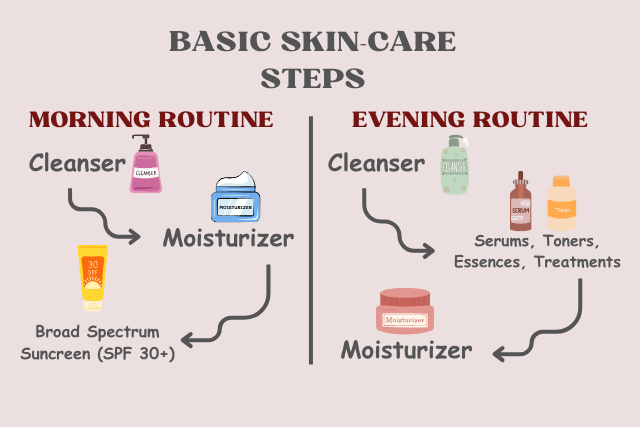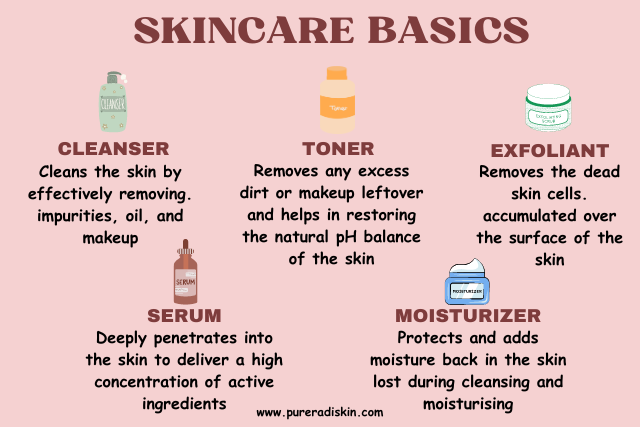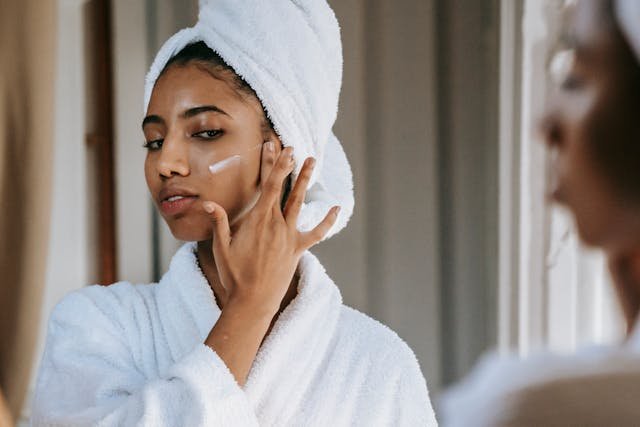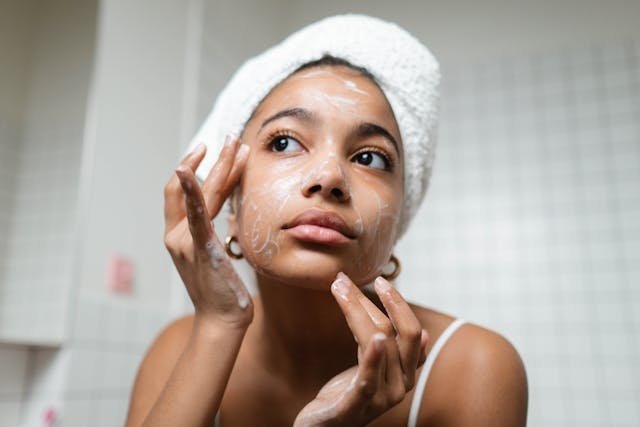Start with gentle cleansing and moisturizing. Always wear sunscreen to protect your skin from UV damage.
Starting a skincare routine can be overwhelming, but it doesn’t have to be. Focus on a few essential steps to create a solid foundation. Cleanse your face daily to remove dirt and impurities. Moisturizing keeps your skin hydrated and healthy.
Sunscreen is crucial to prevent sun damage and premature aging. Avoid using too many products at once, as this can irritate your skin. Consistency is key; stick to your routine to see results. Drinking plenty of water and maintaining a balanced diet also contribute to healthy skin. Listen to your skin’s needs and adjust your routine accordingly. Keep it simple, and your skin will thank you.

Introduction To Skincare
Starting a skincare routine can feel overwhelming. There are so many products and techniques to choose from. But don’t worry! This guide will help you get started with easy-to-follow tips.
Why Skincare Matters
Skincare is essential for maintaining healthy skin. It helps to protect your skin from environmental damage and aging. Here are some reasons why skincare matters:
Prevents Skin Issues: A good routine can prevent acne, dryness, and other problems.
Boosts Confidence: Healthy skin can make you feel more confident.
Slows Aging: Proper care can slow down the signs of aging.
Protects Against Sun Damage: Using sunscreen can prevent harmful UV damage.
Common Skincare Myths
There are many myths about skincare. Believing these can harm your skin. Let’s debunk some of the most common myths:
Myth | Truth |
|---|---|
Oily skin doesn’t need moisturizer | Oily skin needs hydration too. Use a lightweight moisturizer. |
Natural products are always better | Not all natural products are safe for your skin. Always read labels. |
You only need sunscreen on sunny days | Sunscreen is necessary every day, even on cloudy days. |
Expensive products are more effective | Price does not guarantee effectiveness. Look for ingredients that work for you. |
Remember, the key to great skin is consistency. Stick to a simple routine and be patient.
Identifying Your Skin Type
Understanding your skin type is the first step in any skincare routine. Knowing whether your skin is oily, dry, or combination helps you pick the right products. Let’s explore the characteristics of each skin type.
Oily Skin Characteristics
Dry skin lacks natural moisture. This type of skin often feels tight and rough. Here are some signs of dry skin:
Flaky or scaly texture
Itchiness and irritation
Fine lines and wrinkles
Dull or ashy tone
If your skin matches these traits, it’s dry. Opt for hydrating products with ingredients like hyaluronic acid and glycerin.
Dry Skin Characteristics
Dry skin lacks natural moisture. This type of skin often feels tight and rough. Here are some signs of dry skin:
Flaky or scaly texture
Itchiness and irritation
Fine lines and wrinkles
Dull or ashy tone
If your skin matches these traits, it’s dry. Opt for hydrating products with ingredients like hyaluronic acid and glycerin.
Combination Skin Characteristics
Combination skin is a mix of oily and dry skin types. You may have an oily T-zone and dry cheeks. Here are some signs:
Oily forehead, nose, and chin (T-zone)
Dry or normal cheeks
Visible pores in the T-zone
Occasional breakouts
If you notice these signs, you have combination skin. Use products that balance oil and moisture.
Identifying your skin type helps you tailor your skincare routine. Choose products that cater to your specific needs. This ensures healthier, glowing skin.
Building A Basic Skincare Routine
Starting a skincare routine can feel overwhelming. But with some simple steps, you can achieve healthy, glowing skin. A basic skincare routine includes cleansing, moisturizing, and sunscreen. Let’s break it down.
Cleansing Essentials
Cleansing is the first step in any skincare routine. It removes dirt, oil, and makeup from your face. Choose a gentle cleanser that suits your skin type. For oily skin, use a gel-based cleanser. For dry skin, a cream-based cleanser works best.
Follow these steps for effective cleansing:
Wet your face with lukewarm water.
Apply a small amount of cleanser.
Gently massage it into your skin.
Rinse thoroughly and pat your face dry.
Importance Of Moisturizing
Moisturizing keeps your skin hydrated and soft. Even oily skin needs moisture. Choose a moisturizer based on your skin type. For oily skin, use a lightweight, oil-free moisturizer. For dry skin, a thicker cream is better.
Follow these tips for effective moisturizing:
Apply moisturizer to damp skin for better absorption.
Use a pea-sized amount for your entire face.
Gently massage it in circular motions.
Sunscreen Basics
Sunscreen protects your skin from harmful UV rays. Even on cloudy days, UV rays can damage your skin. Use a broad-spectrum sunscreen with at least SPF 30.
Follow these steps for effective sun protection:
Apply sunscreen 15 minutes before going outside.
Use enough to cover all exposed skin.
Reapply every two hours, especially if sweating or swimming.
Building a basic skincare routine is easy. Just remember to cleanse, moisturize, and protect your skin from the sun. Your skin will thank you!

Choosing The Right Products
Starting a skincare routine can be overwhelming. The key to success is choosing the right products. This guide will help you understand ingredients and find the best products for beginners.
Understanding Ingredients
Ingredients play a huge role in skincare. Here are some common ones:
Hyaluronic Acid: Keeps skin hydrated.
Salicylic Acid: Fights acne and unclogs pores.
Vitamin C: Brightens the skin and reduces dark spots.
Retinol: Reduces wrinkles and improves skin texture.
Niacinamide: Reduces redness and evens skin tone.
Product Recommendations For Beginners
Here are some beginner-friendly products:
Product | Type | Key Ingredient |
|---|---|---|
Cetaphil Gentle Cleanser | Cleanser | Glycerin |
Neutrogena Hydro Boost | Moisturizer | Hyaluronic Acid |
The Ordinary Niacinamide 10% + Zinc 1% | Serum | Niacinamide |
CeraVe AM Facial Moisturizing Lotion | Sunscreen | SPF 30 |
These products are easy to use and effective. Remember to patch-test new products. This ensures you don’t have an allergic reaction.
Healthy Skincare Habits
Healthy skincare habits form the foundation of glowing, clear skin. It’s not just about the products you use. Your daily routines and lifestyle play a crucial role. Below are essential habits to integrate into your skincare journey.
Hydration And Diet
Hydration is key to maintaining healthy skin. Drink at least eight glasses of water daily. Water helps flush out toxins. It keeps your skin hydrated from the inside out.
Diet is equally important. Eat a balanced diet rich in vitamins and minerals. Include plenty of fruits and vegetables. Foods high in antioxidants, like berries and leafy greens, are especially beneficial. Omega-3 fatty acids found in fish and nuts can also improve skin texture.
Food | Benefits |
|---|---|
Berries | Rich in antioxidants |
Leafy Greens | High in vitamins A, C, and E |
Fish | Contains Omega-3 fatty acids |
Nuts | Good source of healthy fats |
Consistent Sleep Patterns
Sleep affects your skin’s health. Aim for 7-8 hours of sleep each night. During sleep, your skin repairs itself. Lack of sleep can lead to dark circles and dull skin.
Maintain a consistent sleep schedule. Go to bed and wake up at the same time daily. This helps regulate your body’s internal clock. A good night’s sleep also reduces stress, which benefits your skin.
Creating a bedtime routine can improve sleep quality. Avoid screens an hour before bed. Read a book or practice meditation to relax your mind.
Dealing With Common Skin Issues
Starting a skincare routine can feel overwhelming. Many people face common skin issues. Understanding how to deal with them is key. Below, we tackle some frequent problems and provide practical solutions.
Acne Solutions
Acne is a common concern for many. It can affect your confidence. Here are some tips to manage it:
Use a gentle cleanser twice a day.
Avoid touching your face to prevent bacteria spread.
Apply a non-comedogenic moisturizer to keep skin hydrated.
Use products with salicylic acid or benzoyl peroxide.
Consistency is crucial. Stick to your routine for the best results.
Managing Sensitivity
Sensitive skin can react to many products. It’s important to be cautious:
Choose fragrance-free products to avoid irritation.
Patch-test new products on a small skin area.
Use a hydrating serum to soothe your skin.
Apply sunscreen daily to protect from UV rays.
Always read labels carefully. Look for soothing ingredients like aloe vera and chamomile.
When To See A Dermatologist
Skincare can be tricky, especially for beginners. Knowing when to see a dermatologist can save your skin. A dermatologist can diagnose and treat skin issues early.
Signs You Need Professional Help
There are several signs that indicate you need a dermatologist’s expertise. Here are some common ones:
Persistent Acne: If acne doesn’t improve with over-the-counter treatments.
Rashes or Itchy Skin: Unexplained rashes that don’t go away.
Moles: Changes in size, shape, or color of moles.
Hair Loss: Sudden or excessive hair loss.
Skin Infections: Red, swollen, or painful skin.
What To Expect During A Visit
Knowing what to expect can ease your anxiety. During a visit to a dermatologist, you will experience the following:
Initial Consultation: The dermatologist will ask about your skin concerns and medical history.
Skin Examination: A thorough check of your skin, scalp, and nails.
Diagnosis: The dermatologist will diagnose any conditions and explain them.
Treatment Plan: A tailored plan may include prescriptions, lifestyle changes, or procedures.
Follow-Up: You may need follow-up visits to monitor progress.
Seeing a dermatologist can make a big difference in your skincare routine. Don’t hesitate to seek professional advice when needed.

Advanced Skincare Tips
You’ve mastered the basics of skincare and are ready to level up. Advanced skincare tips can help you achieve glowing, healthy skin. This section covers key techniques and products that can make a big difference.
Exfoliation Techniques
Exfoliation removes dead skin cells and promotes skin renewal. There are two main types: physical and chemical.
Type | Description | Frequency |
|---|---|---|
Physical Exfoliation | Uses small grains or brushes to scrub the skin. | 1-2 times a week |
Chemical Exfoliation | Uses acids like AHA or BHA to dissolve dead cells. | 1-2 times a week |
Incorporating Serums And Masks
Serums and masks provide targeted treatments for your skin. They contain concentrated ingredients that address specific concerns.
Serums: Use after cleansing and before moisturizing.
Masks: Use once or twice a week for extra care.
Choose serums and masks based on your skin type and concerns. For example, hyaluronic acid for hydration or vitamin C for brightening.
Maintaining Long-term Skincare
Maintaining long-term skincare requires consistency and adaptation. Your skin changes over time. It’s essential to adjust your routine to meet these changes. This ensures your skin remains healthy and vibrant through the years.
Adapting To Seasonal Changes
Seasons impact your skin’s needs. During winter, the air is dry. This can lead to dry and flaky skin. Use a thicker moisturizer to combat dryness.
In summer, your skin may become oily. Switch to a lighter, oil-free moisturizer. Always use sunscreen to protect against UV rays. Here is a quick seasonal skincare guide:
Season | Skincare Tip |
|---|---|
Winter | Use a thick moisturizer |
Summer | Use a light, oil-free moisturizer |
Spring | Exfoliate to remove dead skin |
Autumn | Repair summer damage with serums |
Aging Gracefully
Aging is a natural process. Embrace it with a proper skincare routine. Use products that promote collagen production. This helps maintain skin elasticity.
Incorporate anti-aging ingredients into your routine. Look for retinol, vitamin C, and hyaluronic acid. These ingredients help reduce fine lines and wrinkles. Also, always stay hydrated. Drink plenty of water every day.
Here is a simple anti-aging routine:
Cleanse your face with a gentle cleanser.
Apply a serum with anti-aging ingredients.
Moisturize with a rich, nourishing cream.
Use sunscreen to protect against UV damage.
Consistency is key to seeing results. Stick to your routine daily.
Frequently Asked Questions
How To Start A Skincare Routine?
Begin with a gentle cleanser, followed by a moisturizer. Use sunscreen daily. Introduce products slowly to avoid irritation.
What Is The Best Cleanser For Beginners?
Choose a gentle, fragrance-free cleanser. It should effectively remove dirt without stripping natural oils.
How Often Should I Exfoliate My Skin?
Exfoliate 1-2 times a week. Over-exfoliation can cause irritation and damage to your skin barrier.
Why Is Sunscreen Important In Skincare?
Sunscreen protects your skin from harmful UV rays. It prevents premature aging and reduces the risk of skin cancer.
Lastly
Achieving healthy skin doesn’t have to be complicated. Start with gentle products and maintain a consistent routine. Always remember to hydrate and protect your skin from the sun. With patience and care, your skin will thank you. Embrace these beginner skincare tips and enjoy a radiant, glowing complexion.



